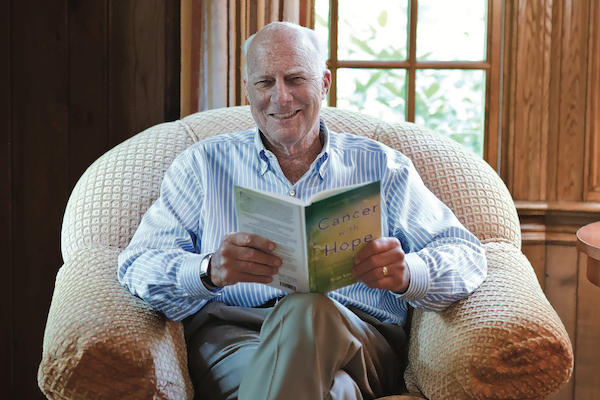Finding a Path to Hope
Even in the Most Difficult Moments
by Mike Armstrong
As a young man, I worked my way up from an entry-level position at IBM to second in command as one of the company’s top executives. Later, I served as CEO of Hughes Electronics, Comcast, and AT&T. My experience leading some of the world’s top companies gave me firsthand knowledge of how to overcome difficult challenges.
However, in the early 1990s, when my doctors told me I had late-stage leukemia, I faced a new challenge that not only threatened to derail my life but potentially take it away.
Miraculously, I survived. One life-threatening cancer experience is enough for a lifetime, or so I thought. Fifteen years later, I was diagnosed with advanced prostate cancer. Once again, I was told I might not survive.
Then, as if that wasn’t enough, the disease and its treatment triggered another disease – a rare form of nerve damage called Parsonage Turner syndrome, which made my diaphragm all but useless. In short, I could hardly breathe.
No matter how bad it looks, there is almost always a path to hope.
In facing these compounding health issues, I could easily have lost sight of the light at the end of cancer’s dark tunnel. However, I made a deliberate decision to hold on to hope and not let cancer define me or own me, something I write about in my book Cancer with Hope: Facing Illness, Embracing Life, and Finding Purpose.
Today, I’m 83 years old and thriving. If there’s one thing I’ve learned, it’s that no matter how bad it looks, there is almost always a path to hope.
With hope, we can find the strength to face adversity. Hope can get us through almost anything. It can even help us heal. Many experts agree that hope plays a significant role in how people with cancer engage in their care and perhaps even how they respond to treatments.
My mission now is to help cancer survivors everywhere find a path to hope. While there’s no single way forward, I have discovered several means for holding onto hope even in the most difficult moments.
Focus on the facts.
The cancer journey is filled with uncertainty. It can be easy to get caught up in the despair of asking hypothetical questions and dwelling on the “what ifs.” But the only way to manage all this uncertainty while still being hopeful is to focus on the facts: current test results, your doctor’s experience and recommendations, the latest data and research on your type of disease, and the very important fact that there are certain things we simply do not know about cancer.
Make a plan.
Working with your healthcare team to develop a cancer care plan is far more constructive and empowering than worrying about things that are out of your control. Once the plan is in place, concentrate on executing it one step at a time so you don’t lose yourself in the enormity of cancer.
Build an arsenal of resources.
Nobody should be alone on the cancer journey. There are dozens, if not hundreds, of excellent resources out there for finding information, advice, support, and state-of-the-art treatment.
Reframe this crisis as an opportunity.
Cancer dramatically changes our perspective on life and what we want to do with it. Many cancer survivors, including myself, have experienced this change. In many ways, it’s the silver lining that comes with that dark cloud of cancer. When we fear our days might be numbered, time becomes much more precious and we develop a fervent desire to use it wisely. For example, one cancer survivor featured in my book devoted her life to helping other people with cancer enroll in clinical trials, another started a nonprofit organization to provide support for young women with breast cancer. As for me, along with my wife, Anne, I have donated most of our net worth to projects that advance medicine, help the disadvantaged, and hopefully make this world a better place. This has infused me with a sense of purpose, which has expanded my hope, empowered my cancer journey, and helped me to thrive.
Mike Armstrong is the former chairman and CEO of Comcast, AT&T, and Hughes Electronics. He began his career at IBM, where he spent more than three decades rising through the ranks to become chairman of the IBM World Trade Corporation. Having battled leukemia and prostate cancer, as well as serious illness, throughout the 1990s and early 2000s, he became an active supporter of Johns Hopkins University and Health System after retiring from the corporate world in 2002. In 2005, he was named chair of the Board of Trustees of Johns Hopkins Medicine. Now fully retired, Mike is on a mission to share his story as a two-time cancer survivor to help others on the cancer journey find hope.
This article was published in Coping® with Cancer magazine, March/April 2022.
Everyone has a unique story to share. Do you want to share your survivor story?
We consider a cancer survivor to be anyone living with a history of cancer –
from diagnosis through the remainder of life.
Here are our submission guidelines.


